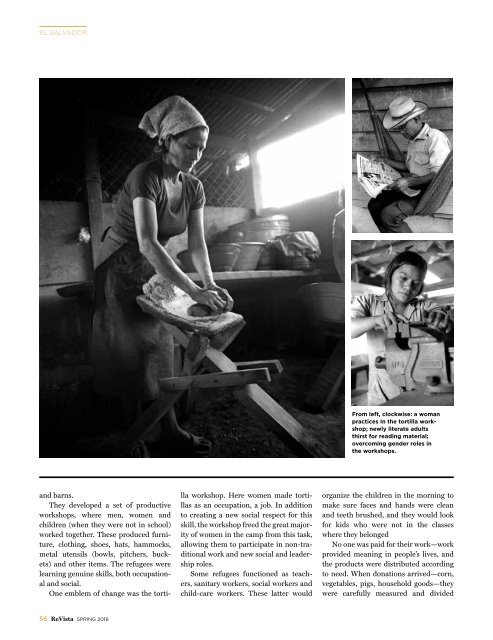EL SALVADOR
8clowSgZh
8clowSgZh
Create successful ePaper yourself
Turn your PDF publications into a flip-book with our unique Google optimized e-Paper software.
<strong>EL</strong> <strong>SALVADOR</strong><br />
From left, clockwise: a woman<br />
practices In the tortilla workshop;<br />
newly literate adults<br />
thirst for reading material;<br />
overcoming gender roles in<br />
the workshops.<br />
and barns.<br />
They developed a set of productive<br />
workshops, where men, women and<br />
children (when they were not in school)<br />
worked together. These produced furniture,<br />
clothing, shoes, hats, hammocks,<br />
metal utensils (bowls, pitchers, buckets)<br />
and other items. The refugees were<br />
learning genuine skills, both occupational<br />
and social.<br />
One emblem of change was the tortilla<br />
workshop. Here women made tortillas<br />
as an occupation, a job. In addition<br />
to creating a new social respect for this<br />
skill, the workshop freed the great majority<br />
of women in the camp from this task,<br />
allowing them to participate in non-traditional<br />
work and new social and leadership<br />
roles.<br />
Some refugees functioned as teachers,<br />
sanitary workers, social workers and<br />
child-care workers. These latter would<br />
organize the children in the morning to<br />
make sure faces and hands were clean<br />
and teeth brushed, and they would look<br />
for kids who were not in the classes<br />
where they belonged<br />
No one was paid for their work—work<br />
provided meaning in people’s lives, and<br />
the products were distributed according<br />
to need. When donations arrived—corn,<br />
vegetables, pigs, household goods—they<br />
were carefully measured and divided<br />
56 ReVista SPRING 2016


